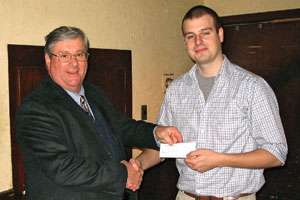
CHAMPAIGN, Ill. — Have you ever wondered what effect the introduction of muskellunge into a fishery has on the largemouth bass? If you're like most bass anglers, you're pretty sure that the toothy fish will win the competition with the bass for food and habitat, and may even be a voracious predator upon the bass themselves.
In Illinois, the number of lakes with muskellunge introduction has increased from six to 38 in the last 20 years, so there is a fair amount of angst among Illini bass anglers about this issue. Hopefully, within the next couple of years, a young researcher at the University of Illinois will finally have definitive answers not only to these questions, but also about issues concerning habitat loss.
Corey DeBoom, a master's degree candidate at the University of Illinois, has been awarded the ninth annual Ron Ward Memorial Scholarship from the Champaign-Urbana Bass Club, an Illinois BFN member club. The $8,000 award brings the club's research scholarships total to nearly $60,000 to assist fisheries biology/management graduate students with their bass research.
"Over the past two years, I have been addressing the muskellunge concerns using both current and past data on largemouth bass populations from eight Illinois lakes collected both before and after muskellunge introductions," stated DeBoom. "This analysis includes an examination of muskellunge diet and a test of muskellunge impact on bass size structure and abundance over many years of muskellunge stockings. It is my hope that this research will help to address these concerns, assist in the formation of informed management decisions and ease tensions between angling groups."
Studying under Dr. David H. Wahl, DeBoom plans to work toward his Ph.D. by researching the role of woody habitat in lake ecosystems and the importance of littoral habitat to fish populations.
"Growing up in Iowa, I experienced firsthand how human activities like agriculture and lakeshore development can harm water quality and valuable bass habitat," said DeBoom. "As an avid angler, I became intimately aware of the impacts of these threats to fisheries, and this spurred my concern and passion to become a fisheries scientist.
"My interests are focused on species interactions and the importance of habitat to the functioning of lake ecosystems. Understanding the ecology of lake habitats has important implications for bass conservation for several reasons. Lake habitats are currently being impacted by shoreline development that removes coarse woody habitat and has negative effects on aquatic vegetation. Previous research has shown these habitats to be an important component of predator-prey dynamics, as well as the physical and biological processes that govern overall lake productivity and bass population stability. In addition, habitat additions in the form of vegetation plantings or brushpiles are common management practices. Knowledge of the specific roles of the various habitat types is therefore important to understand the implications of habitat modification whether it is in the form of additions or losses due to development."
Before beginning post-graduate work at the University of Illinois, DeBoom had extensive fisheries research experience in other areas. While at Iowa State University earning his bachelor's degree in fisheries and aquatic sciences, he worked summers for the Iowa Department of Natural Resources' invasive species program. There, he interviewed and educated boaters about the dangers of Eurasian milfoil, zebra mussels and Asian carp. He also worked a summer for the Indiana DNR on Lake Michigan studying smallmouth bass responses to the round goby invasion.
The Champaign-Urbana Bass Club is very proud of the contributions to fisheries management and science that all of their former scholarship winners have made. It fully expects DeBoom to add his name to the long list of outstanding graduate students who are making bass research/management their lives' work.




